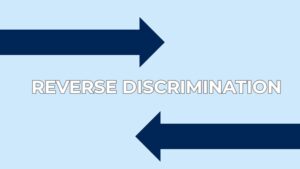Under Title VII of the Civil Rights Act of 1964, Diversity Equity and Inclusion initiatives, policies, programs, or practices may be unlawful reverse discrimination if they involve an employer or other covered entity taking an employment action motivated—in whole or in part—by an employee’s or applicant’s race, sex, or another protected characteristic. The Equal Employment Opportunity Commission has released a policy document entitled “What You Should Know About DEI-Related Discrimination at Work” highlighting the following:
- Do Title VII’s protections only apply to individuals who are part of a “minority group,” (such as racial or ethnic minorities, workers with non-American national origins, “diverse” employees, or “historically under-represented groups”), women, or some other subset of individuals?
No. Title VII’s protections apply equally to all workers. Different treatment based on race, sex, or another protected characteristic can be unlawful discrimination, no matter which employees or applicants are harmed. This has been the long-standing position of the EEOC and the Supreme Court.
The EEOC does not require a higher showing of proof for so-called “reverse” discrimination claims. The EEOC’s position is that there is no such thing as “reverse” discrimination; there is only discrimination. The EEOC applies the same standard of proof to all race discrimination claims, regardless of the victim’s race.
- Are only employees protected from DEI-related discrimination at work?
No. Title VII protects employees, applicants, and training or apprenticeship program participants. Title VII also may apply to interns. Depending on the facts, interns may be covered as employees, as applicants, or as training program participants. Title VII applies to employers with 15 or more employees, but note that New York State and City law applies to all employers.
- When is a DEI initiative, policy, program, or practice unlawful under Title VII?
Under Title VII, an employer initiative, policy, program, or practice may be unlawful if it involves an employer or other covered entity taking an employment action motivated—in whole or in part—by race, sex, or another protected characteristic.
Among other things, Title VII bars discrimination (“disparate treatment”) against applicants or employees in hiring, firing, compensation, or any term, condition, or privilege of employment. The prohibition against discrimination applies to a wide variety of aspects of employment. In order to allege a colorable claim of discrimination, workers only need to show “some injury” or “some harm” affecting their “terms, conditions, or privileges” of employment.
- Can an employer justify taking an employment action based on race, sex, or another protected characteristic because the employer has a business necessity or interest in “diversity,” including preferences or requests by the employer’s clients or customers?
No. Employers violate Title VII if they take an employment action motivated—in whole or in part—by race, sex, or another protected characteristic. Title VII explicitly provides that a “demonstration that an employment practice is required by business necessity may not be used as a defense against a claim of intentional discrimination.”
In particular, client or customer preference is not a defense to race or color discrimination. Basing employment decisions on the racial preferences of clients, customers, or coworkers constitutes intentional race discrimination. Employment decisions based on the discriminatory preferences of clients, customers, or coworkers are just as unlawful as decisions based on an employer’s own discriminatory preferences.
Title VII does not provide any “diversity interest” exception to these rules. Nor has the Supreme Court ever adopted such an exception. No general business interests in diversity and equity (including perceived operational benefits or customer/client preference) have ever been found by the Supreme Court or the EEOC to be sufficient to allow race-motivated employment actions.
- Does Title VII protect employees who oppose unlawful policies or practices, including certain DEI practices or trainings?
Title VII prohibits employers and other “covered entities” from retaliating because an individual has engaged in protected activity under the statute. Generally, protected activity consists of either participating in an EEO process (such as an employer or EEOC investigations or filing an EEOC charge) or opposing conduct made unlawful by Title VII. Depending on the facts, protected opposition could include opposing unlawful employment discrimination related to an employer policy or practice labeled as “DEI.”
As previously noted by the Commission, courts have held that opposition to a DEI training may constitute protected activity if the employee provides a fact-specific basis for his or her belief that the training violates Title VII.
If you have been the victim of reverse discrimination or have questions about your rights as a worker, contact the attorneys of Pechman Law Group at 212-583-9500.




